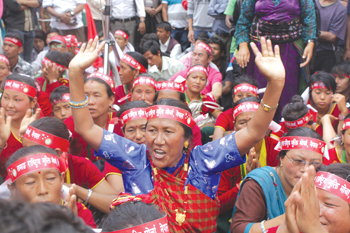
NT ARCHIVE
Nepal is needlessly being pushed to federalise because discredited political leaders need a face-saving agenda
Nepal is the oldest nation state in South Asia and has existed as an integrated country for two-and-half centuries.
Now, our politicians supported by misguided foreign backers, want to disintegrate it. Politicians have used federalism to rabble rouse and stoke communal tensions, but what is much worse is that they aren’t even serious about political devolution: federalism is just a buzzword to camouflage their drive for centralised power.
As chair of the State Restructuring Committee in the ex-CA, Maoist Chairman Pushpa Kamal Dahal wooed seven UML members to his side by agreeing to their individual demands for Sherpa and Mithila provinces. He then backed a model of 14 ethnicity-based federal provinces through majority voting that departed from the practice of consensus-based decision-making.
Dahal outsmarted NC members of the panel who were rooting for a non-ethnic seven province model, but the committee decision exposed the frivolous need to score political points that had become the hallmark of the sensitive issue of constitution writing.
In Dahal’s recent visit to Beijing, Chinese leaders are said to have reiterated their misgivings over ethnicity-based federalism and chided him for supporting it. He then went on to India where he was advised to back a potentially less divisive model of language-based federalism. Suddenly, the decibel level for ethnicity-based federalism has gone down.
The Nepal Federation of Indigenous Nationalities (NEFIN) which saw its western funding dry up is now headed by a young novice from the smaller Kumal ethnic constituency. Kumal defeated a much more radical Maoist-backed candidate.
Could it be that all this is a result of the deep doubts that our big neighbours have about how divisive ethnic politics could destabilise Nepal? If so, it proves once more that our neighbours seem to be more concerned for our welfare than our own populist politicians. The indigenous personalities who were breathing fire and brimstone while being beneficiaries of western funding have suddenly abandoned NEFIN in droves.?
Let’s face it: federalising the country and doing so along ethnic lines was never the demand of the Nepali people. In a normal democracy, that majority opinion would have been put to a referendum. While a majority of Nepalis rue the demise of the CA, they are glad it was dissolved before it could pass a constitution that would effectively break the country up into little pieces.
Ethnicity-based federalism was a strategy adopted by the Maoists to drive a wedge between the government and people during the war, as well as to help their recruitment of young fighters. After the ceasefire in 2006, this agenda was force-fed to other parties which had lost their support base. Had the NC and UML been convinced about the need for federalism, they would have proposed it back in 1990.
Ethnic autonomy was the core of the Maoist proposal for federalising the country. This meant carving out the country into provinces defined by ethnicity a la Mao Zedong and Josef Stalin: a model that China is not so enamoured with anymore and which ultimately led to the disintegration of the Soviet Union.
There is no rationale anymore for Nepal to be federalised. Effective devolution of political power to the districts through genuine decentralisation will be the least disruptive and catalyse development. But try telling that to the political parties and their discredited leaders.?
The Maoists and the other parties that followed the federalisation bandwagon cannot do a U-turn without losing face, so it is a question of who has the courage to bell the cat. Rural Nepal that makes up 85 per cent of population is saturated by two highly inclusive community organisations: Community Forest User Groups numbering 18,000 and at least
100,000 Mothers’ Groups that include nearly all rural households in the country.
If the political parties are serious about elections, they should ask these organisations if they would like to see the country broken up into federal provinces and gauge the public mood. Local people whose views have not been distorted by external funding are more honest and forthcoming with their real opinions. Poll after poll has shown that they have serious misgivings about federalism – especially of the ethnic variety. If the response to federalism is ‘no’, then there is no need to repeat past mistakes and elect a new CA. We can just have direct parliamentary elections to amend the Interim Constitution, institute true political devolution, and move ahead. But few politicians (except perhaps Chitra Bahadur KC) have the courage to call it like it is.?
Bihari K Shrestha is an anthropologist and is a retired civil servant.